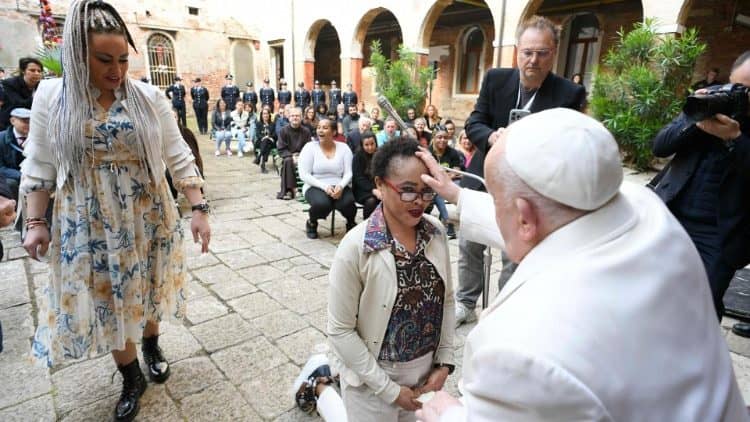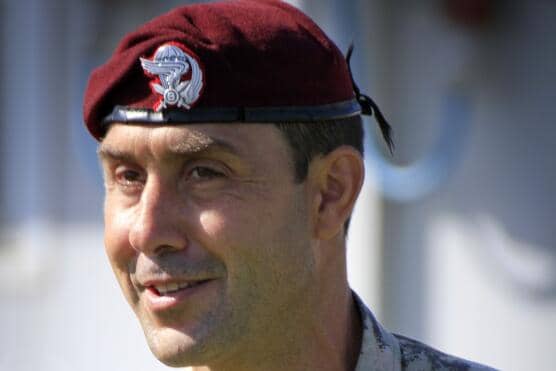ROME – Victims of the gruesome 2019 Easter bombings in Sri Lanka gathered in Rome this week alongside local church leaders to seek support from the pope and to call for justice and an independent inquiry into who is responsible.
Speaking to journalists Monday, Sri Lankan Cardinal Malcolm Ranjith of Colombo, said 269 people died and 500 others were wounded during the attacks, yet three years later, “we still don’t know why, or who did these attacks.”
“It was attributed to a group of radical Islamists, but you can see indications that it was beyond radical Islamist groups, and there are indications that there is a political plot behind it,” he said, and accused the government of blocking efforts to uncover what really happened.
“Right now, we want to know the truth,” he said, which is why they are taking their campaign international.
Ranjith spoke after presiding over an anniversary Mass at St. Peter’s Basilica in Rome for the victims of the 2019 Easter bombings in Sri Lanka, which targeted three Christian churches, two of which were Catholic, as well as three luxury hotels.
He was accompanied by all the bishops of Sri Lanka, as well as a group of victims and their families.
Saman Nandana, a Buddhist from Colombo, lost his 22-year-old son and 19-year-old daughter in the bombings.
Speaking to Crux, Nandana said his children were preparing for a major exam at school, “so they went to get a blessing” at one of the churches ahead of the big day.
Nandana said he came to Rome because “we didn’t get any justice from our country, so when we met the pope here, we felt so happy and peaceful. I know my children won’t come back, but I at least want justice, I want to know why my children died.”
Similarly, M Rizwan, a Muslim from Colombo whose wife is Catholic, lost his only son at one of the churches that was bombed. His son had also gone for a blessing ahead of his exams.
Rizwan said he came to Rome “to know the reason why my child died. We haven’t received any justice from our homeland. The politicians, they didn’t respond to us, and they are irresponsible. I want to know why my child died.”
The 2019 bombings, which claimed the lives of 45 foreigners from 14 countries in addition to locals, marked the worst such attack in Sri Lanka’s history. Pressure over finding who is responsible has mounted in recent months alongside increasing calls for a change in regime.
Since April 9, protesters have gathered daily to demand that Sri Lankan President Gotabaya Rajapaksa resign, blaming him for the country’s deteriorating economic crisis, while clergy and churchgoers throughout Sri Lanka and beyond are calling on the government to do more to achieve justice and closure for the 2019 bombings.
The attack was blamed on local armed groups allegedly affiliated with ISIS, and last November a trial was opened against 25 men accused of orchestrating the plot. However, in January, the trial was adjourned to allow time for indictments to be translated into the local Tamil language, and families are impatient with the stalling of the process.
Rajapaksa, who came to power in the aftermath of the bombings, promised to rid the country of terror and to lead an expedited probe into the incident, however, critics have faulted his administration for failing to press charges against former President Maithripala Sirisena, who allegedly received an intelligence report 17 days prior to the Easter bombings warning that an attack was imminent.
Victims and family members have also protested the acquittal of former police chief Pujith Jayasudara and former defense secretary Hemasiri Fernando, both of whom were charged with crimes against humanity for failing to act on the intelligence report and prevent the bombings.
Ranjith has become increasingly vocal about the situation in recent months, openly questioning the government’s investigation.
Speaking during a session of the United Nations Human Rights Council in Geneva last month, Ranjith called for a UN-led probe into the 2019 attacks, which he said appears to be part of a “grand political plot,” rather than the act of a fringe extremist group.
In his remarks to journalists Monday, Ranjith said he and the victims of the attack came to Rome “to cry out to the world and to ask for justice.”
“The government wants to hide everything, attributing everything to an Islamic group, perhaps to create tension” among religious groups, he said, and called for a “transparent,” UN-led independent investigation.
Pointing to the victims alongside him, Ranjith noted that one of the women used to be a dance instructor, but is now confined to a wheelchair after being injured by shrapnel in one of the churches. The woman lost her only child in the bombing, and her husband left her afterward, leaving her vulnerable and alone.
Ranjith also pointed to a child who was blinded by shrapnel in an evangelical church that was bombed in Batticaloa.
Jacinta Hepiarci, who is also largely confined to a wheelchair due to the shrapnel that was lodged in her knees and ankles during the bombing, said she made the unusual decision to go to Mass alone that morning, while her children slept in and were planning to attend Mass in the afternoon. Her husband was traveling, and returned immediately after receiving news of the attack.
“I usually go with them, but just that morning I went (alone). Now I am injured like this,” she said, pointing to her knees and ankles. “Why, God knows, we wait for God to tell us. We know with certainty that God is watching us.”
Hepiarci said she felt “a lot of love” being with the pope, and voiced confidence that God is close to the injured, to those who died, and those who mourn them.
Prasanna Fernando, who sustained brain injuries when shrapnel lodged into his skull during one of the church bombings, was sitting in a wheelchair alongside his wife, who said her husband suffered three cardiac arrests while doctors were operating on him to remove the shrapnel.
“He can’t walk,” she said. “There is no improvement at all” in his condition due to his brain injuries.
“I don’t think there will be any improvements; he will be like this for the rest of his life. It’s really hard,” she said, as both she and her husband wiped tears from their eyes.
“We can’t imagine that this happened in church, but we have not lost our faith. This incident has brought us closer to God,” she said, saying through tears that to be in Rome with the pope as they mark the third anniversary of the bombing that changed their lives forever “is like being with Christ; it’s as if we saw Jesus.”
Ranjith asked the world not to forget about Sri Lanka and their quest for justice, saying the next steps are to pursue the “transparent international investigation to know who was behind this.”
Pope Francis’s voice, he said, is important, because for them his is “the voice of the world, of the church, and also of the people…he gave us full support, it could not have been better.”
In his brief greeting to the Sri Lankan community after Monday’s Mass, Pope Francis said Jesus also died a violent death, taking upon himself “not only death, but the cruelty of evil, hatred, and fratricidal violence.”
“His cross and his resurrection are a light of hope in the thickest darkness,” he said, and prayed for all victims of violence and terrorism.
He also prayed for those with political responsibility, asking that the present difficulties Sri Lanka is facing will be solved with “the commitment and collaboration of all.”
Francis closed his remarks issuing a direct appeal to Sri Lankan authorities to “please, for the love of justice, for the love of your people, may it be clarified who was responsible for these events. This will bring peace to your conscience and to the homeland.”
Follow Elise Ann Allen on Twitter: @eliseannallen














